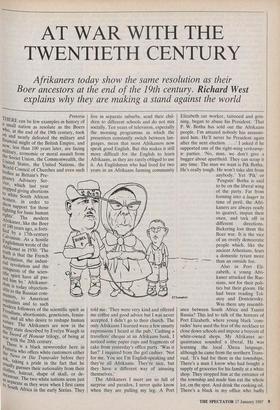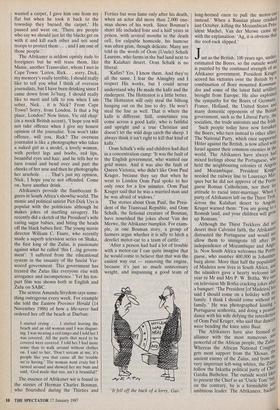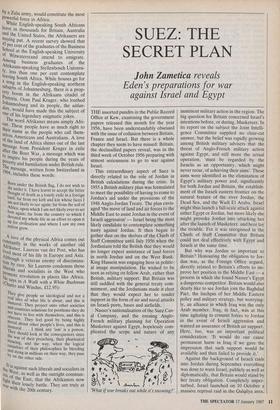AT WAR WITH THE TWENTIETH CENTURY
Afrikaners today show the same resolution as their
Boer ancestors at the end of the 19th century. Richard West
explains why they are making a stand against the world
Pretoria THERE can be few examples in history of a small nation as resolute as the Boers who, at the end of the 19th century, took 2e and nearly defeated the military and financial might of the British Empire, and new, less than 100 years later, are facing military, economic or moral assault from the Soviet Union, the Commonwealth, the United States, the United Nations, the World Council of Churches and even such bodies as Britain's Pre- g9.411cY Advisory Ser- vice, which last year stepped giving abortions to white South African women, in order to show support 'for those 9gbting for basic human rights'. The modern Afrikaner, like the Boer years ago, is forti- tied .by a 17th-century Calvinism. As a hostile Englishman wrote of the Afrikaner in 1930: 'The truth is that the French Kevolution the indust- rial revolution and the eenquests of the scien- tific spirit have all pas- sed hire by.' Afrikaner- d °el is today objection- able to the Russian com- munists to American caPitalists and to such modernfollowers of the scientific spirit as Freudians, abortionists, geneticists, femin- ists, and all who desire to reshape human nature. 'The Afrikaners are now in the th"13133/ state described by Evelyn Waugh in e Sword of Honour trilogy, of being at war with the 20th century. „ There is a black newsvendor here in the who offers white customers either ine News or Die Transvaler before they _ask, taking a pride in the fact that he Usually guesses their nationality from their :tees, haircut, shape of skull, or de- meanour. The two white nations seem just to 7Parate as they were when I rs came South Africa in the early Sixtifies.t They live in separate suburbs, send their chil- dren to different schools and do not mix socially. Ten years of television, especially the morning programme in which the presenters constantly switch between lan- guages, mean that most Afrikaners now speak good English. But this makes it still more difficult for the English to learn Afrikaans, as they are rarely obliged to use it. An Englishman who had lived for two years in an Afrikaans farming community told me: 'They were very kind and offered me coffee and good advice but I was never accepted. I didn't go to their church. The only Afrikaans I learned were a few smutty expressions I heard at the pub.' Cashing a travellers' cheque at an Afrikaans bank, I noticed some paper cups and fragments of cake from yesterday's office party. Was it fun?' I inquired from the girl cashier. 'Not for me. You see I'm English-speaking and they're all Afrikaans. They're nice, but they have a different way of amusing themselves.'
The Afrikaners I meet are so full of surprise and paradox, I never quite know when they are pulling my leg. A Port Elizabeth car worker, tattooed and grin- ning, began to abuse his President: 'That P. W. Botha has sold out the Afrikaans people. I'm amazed nobody has assassin- ated him. He'll never be President again different directions. Bickering lost them the Boer war. It is the vice of an overly democratic people which, like the ancient Athenians, fears a domestic tyrant more than an outside foe.
Also in Port Eli- zabeth, a young Afri- kaner attacked the Rus- sians, not for their poli- tics but their gloom. He had been reading Tol- stoy and Dostoievsky. Was there any resembl- ance between South Africa and Tsarist Russia? This led to talk of the horrors of Port Elizabeth, where young black 'com- rades' have used the fear of the necklace to close down schools and impose a boycott of white-owned shops. My Afrikaner ac- quaintance sounded a liberal. He was learning the local Xhosa language, although he came from the northern Trans- vaal. 'It's bad for them in the townships. There's a man I know who had bought a supply of groceries for his family at a white shop. They stopped him at the entrance of the township and made him eat the whole lot, on the spot. And drink the cooking oil. There's a black in my office who badly wanted a carpet, I gave him one from my flat but when he took it back to the township they burned the carpet.' He paused and went on: 'There are people who say we should just let the blacks get on with it and kill each other and not send troops to protect them . . . and I am one of those people.'
The Afrikaner is seldom openly rude to foreigners but he will tease them, like Manie, another Transvalier, whom I met in Cape Town: 'Listen, Rick. . . sorry, Dick, my memory's really terrible, I should really like to tell you what I think of overseas journalists, but I have been drinking since I came down from Jo'burg. I should really like to meet and talk to you when I am sober, Nick. . it is Nick? From Cape Town? Sorry, from London. Is that a big place, London? Now listen, Vic old chap' (in a mock British accent), 'I hope you will not take offence when I give my honest opinion of the journalist. You won't take offence, will you, Rick? The overseas journalist is like a photographer who takes a naked girl as a model, a lovely woman, with perfect legs and boobs, red lips, beautiful eyes and hair, and he tells her to turn round and bend over and part the cheeks of her arse and then he photographs her arsehole. . . . That's just my opinion, Nick, I hope you're not offended. Come on, have another drink. . .
Afrikaners provide the flamboyant fi- gures in South Africa's showbiz world. The mimic and political satirist Piet-Dirk Uys is popular with the politicians although he makes jokes of startling savagery. He recently did a sketch of the President's wife eating sugar babies, and biting the heads off the black babies first. The young movie director William C. Faure, who recently made a superb television series on Shaka, the first king of the Zulus, is passionate against what he called 'this f...ing govern- ment': 'I suffered from the educational system in the insanity of the fascist Ver- woerd government. This government has treated the Zulus like everyone else with arrogance and incompetence.' Yet his ten- part film was shown both in English and Zulu on SABC.
The actress Amanda Strydom says some- thing outrageous every week. For example she told the Eastern Province Herald (14 November 1986) of how a life-saver had ordered her off the beach at Durban:
I started crying . . . I started leaving the beach and an old woman said I was disgust- ing. I was wearing a red tango and I told her I was covered. All the parts that need to be covered were covered. I told her I had more sense than to walk around without clothes on. I said to her, 'Don't scream at me, it's people like you that cause all the trouble we're having.' The woman went crazy but I turned around and showed her my bum and said. 'God made that too, isn't it beautiful?'
The essence of Afrikaner wit is found in the stories of Herman Charles Bosman, who flourished during the Thirties and Forties but won fame only after his death, when an actor did more than 2,000 one- man shows of his work. Since Bosman's short life included four and a half years in prison, with several months in the death cell, for culpable homicide, his humour was often grim, though delicate. Many are told in the words of Oom (Uncle) Schalk Laurens, who farms in the bad land next to the Kalahari desert. Oom Schalk is no liberal: `Kafirs? Yes, I know them. And they're all the same. I fear the Almighty and I respect His works, but I could never understand why He made the kafir and the rinderpest. The Hottentot is a little better. The Hottentot will only steal the biltong hanging out on the line to dry. He won't steal the line as well. That is where the kafir is different. Still, sometimes you come across a good kafir, who is faithful and upright and a true Christian and doesn't let the wild dogs catch the sheep. I always think it isn't right to kill that kind of kafir.'
Oom Schalk's wife and children had died in a concentration camp: It was the fault of the English government, who wanted our gold mines. And it was also the fault of Queen Victoria, who didn't like Oom Paul Kruger, because they say that when he went to London Oom Paul spoke to her only once for a few minutes. Oom Paul Kruger said that he was a married man and he was afraid of widows.'
The stories about Oom Paul, the Presi- dent of the Transvaal Republic, and Oom Schalk, the fictional creature of Bosman, have nourished the jokes about Van der Merwe, the Afrikaner bumpkin. For exam- ple, in one Bosman story, a group of farmers argue whether it is silly to hitch a derelict motor-car to a team of cattle: `After a person had had a lot of trouble with a motor-car I can quite imagine that he would come to believe that that was the easiest way out — removing the engine, because it's just so much unnecessary weight, and inspanning a good team of 'It fell off the back of a lorry, Guv.'
long-horned oxen to pull the motor-car instead.' When a Russian plane crashed last October, killing the Mozambican Pres- ident Machel, Van der Merwe came UP with the explanation: Vig, it is obvious that the roof-rack slipped.'
Just as the British, 100 years ago, under- estimated the Boers, so the outside world is puzzled by the continued strength of an Afrikaner government. President Kruger scored his victories over the British by a combination of Boer mounted Kommari" dos and some of the latest field artillery brought from Europe. He also exploited the sympathy for the Boers of GermanY, France, Holland, the United States and many domestic opponents of the British government, such as the Liberal Party, the socialists, the trade unionists and the Irish' Such people today have now forsaken the Boers, who turn instead to other allies. The National Party, which once supported Hitler against the British, is now allied with Israel against their common enemies in the world. The Afrikaners have always had mixed feelings about the Portuguese, who held the neighbouring colonies of Angola and Mozambique. President Kruger needed the railway line to Lourenco Mar' ques but he did not approve of the Patti' guese Roman Catholicism, nor their lai attitude to racial inter-marriage. When ,,° party of Afrikaners left on the Thirst Trek, across the Kalahari desert to Angola, Kruger warned them: 'You are going td 3 Romish land, and your children will grow' up Romans.' Although the Thirst Trekkers did ritit desert their Calvinist faith, the Afrikaners distrusted the Portuguese and would not allow them to immigrate till after the independence of Mozambique and Aar la. Now South Africa welcomes the Pores guese, who number 400,000 in Johannes' burg alone. More than half the populatiol of Madeira now lives in South Africa, and the islanders gave a hearty welcome last year to Mr and Mrs P. W. Botha. We say/ on television Mr Botha cracking jokes after a banquet: 'The President [of Madeira] has., said I should come on a holiday with Oil family. I think I should come without my family.' He was photographed kissing 1 Portuguese senhorita, and doing a peasall. dance with his wife defying the interdicrldP of Oom Paul Kruger, who said that dances were bending the knee unto Baal. The Afrikaners have also formed aed alliance with the most numerous all powerful of the African people, the Zulu,5' Whereas the African National Congress ; gets most support from the Xhosas, the ancient enemy of the Zulus, and from 6'; very important left-wing whites, the Zul.uf follow the Inkatha political party of Clite Gatsha Buthelesi. The outside world likes , to present the Chief as an 'Uncle Tom' In on the contrary, he is a formidable OA ambitious leader. The Afrikaners, bacItes' by a Zulu army, would constitute the most Powerful force in Africa. While English-speaking South Africans leave in thousands for Britain, Australia and the United States, the Afrikaners are staying put. A recent survey showed that 45 per cent of the graduates of the Business School at the English-speaking University of Witwatersrand intend to emigrate. Among business graduates of the Afrikaans-speaking Stellenbosch Universi- ty, less than one per cent contemplate leaving South Africa. While houses go for a song in the English-speaking northern suburbs of Johannesburg, there is a prop- erty boom in the Afrikaans citadel of Pretoria. Oom Paul Kruger, who loathed Johannesburg and its people, the uitlan- ders, would have made this the subject of °Ile of his legendary enigmatic jokes. The word Afrikaner means simply Afri- can.. These people have as much right to their name as the people who call them- selves Americans and Australians. A love of the land of Africa shines out of the last message from President Kruger in exile after the Boer War, a message which was inspire nspire his people during the years of The and humiliation under British rule. , ne message, written from Switzerland in 1904, includes these words:
Born under the British flag, I do not wish to die under it. I have learnt to accept the bitter thought of death as a lonely exile in a foreign land, far from my kith and kin whose faces I am not likely to see again; far from the soil of Africa, upon which I am not likely ever to set foot again; far from the country to which I devoted my whole life in an effort to open it up for civilisation and where I saw my own nation grow.
A love of the physical Africa comes out constantly in the works of another old rAtnicaner, Laurens van der Post, who has A iived most of his life in Europe and Asia. t7'ithough a veteran enemy of discrimina- j," by race, Sir Laurens condemns those doerals and socialists in the West who promote revolution in places like Africa. tie says in A Walk with a White Bushman to and Windus, £12.95): They give people an ideological and not a i real idea of what life is about, and this is Immoral. They project onto other societies and countries solutions for problems they do not have to live with themselves, and this is Obscene. They feel good by being highly !floral about other people's lives, and this is unmoral . . . I think any 'ism' is a poison. They should look at the consequences since the War of their preaching, their pharisaical stancing and the way, when the logical casualties of their philosophies lie bleeding dying in millions on their way, they pass by nn the other side.
usIt is against such liberals and socialists in e West, as well as the outright commun. s of the East, that the Afrikaners now fight their lonely battle. They are truly at war with the 20th century.












































 Previous page
Previous page